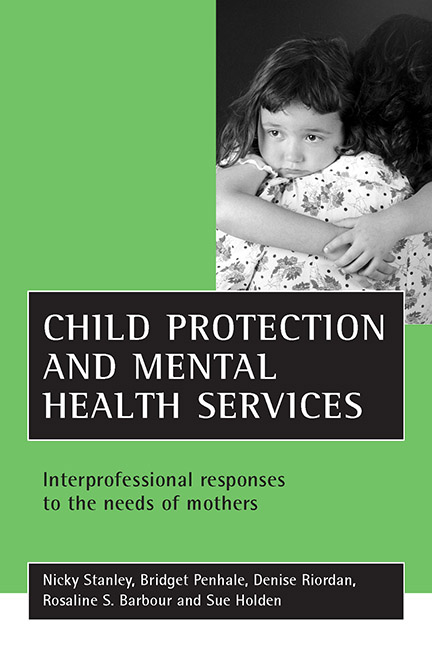Book contents
- Frontmatter
- Contents
- List of tables and figures
- Introduction
- one Mental health needs and mothering
- two The service context
- three Interprofessional work
- four The research study
- five Identifying key research issues
- six Mothers’ perspectives
- seven The mothers’ evaluations of professional support
- eight The professionals and their practice
- nine Conceptualising needs and evaluating risk
- ten Interprofessional communication and coordination
- eleven Identifying appropriate resources
- twelve Conclusion
- References
- Index
- Also available from The Policy Press
ten - Interprofessional communication and coordination
Published online by Cambridge University Press: 20 January 2022
- Frontmatter
- Contents
- List of tables and figures
- Introduction
- one Mental health needs and mothering
- two The service context
- three Interprofessional work
- four The research study
- five Identifying key research issues
- six Mothers’ perspectives
- seven The mothers’ evaluations of professional support
- eight The professionals and their practice
- nine Conceptualising needs and evaluating risk
- ten Interprofessional communication and coordination
- eleven Identifying appropriate resources
- twelve Conclusion
- References
- Index
- Also available from The Policy Press
Summary
Identifying difficulties in interprofessional coordination
This chapter reports on practitioners’ experiences of interprofessional communication and coordination and examines their views on which services were best equipped to take a lead in work with families where mental health needs and child care concerns coincided. Our survey asked respondents to identify the frequency of difficulties in coordinating work on such cases with a wide range of professional groups. As Table 10.1 shows, 35% of practitioners reported always or frequently having problems in coordinating their work with GPs, while 27% reported the same frequency of problems with adult psychiatrists. These rates were substantially higher than the levels of difficulties identified for other professional groups. For example, only 17% reported consistent or frequent difficulties in working with child care social workers, and 12% had a similar level of problems with community psychiatric nurses (CPNs).
The professionals with whom respondents were least likely to experience difficulties were health visitors: 58% reported that they hardly ever or never had problems in coordinating work. Lupton et al (2001) report similar levels of satisfaction from other professionals commenting on their work with health visitors. The other groups of practitioners with whom respondents appeared to have fewer problems were child and family centre workers (49% reported hardly ever or never having difficulties) and child care social workers (42% reported hardly ever or never having difficulties).
Child care social workers, child and family centre workers and children's guardians (formerly known as Guardians ad Litem, this group of professionals will all have trained and practised as child care social workers) were the professional groups most likely to report frequent or constant difficulties with GPs. Over half of the respondents in these three professional groups described a high level of difficulties. In contrast, GPs did not identify similar difficulties in relation to these groups. Few health visitors and CPNs reported high levels of problems with GPs. The professionals who themselves worked in primary care settings, such as health visitors and GPs, were most likely to report very seldom having difficulties in coordinating work with GPs. About half of CPNs sometimes had difficulties with GPs. Professionals working in adult psychiatry were also likely to report that they sometimes had difficulties.
The child care social workers’ evaluations of work with GPs are consonant with the findings of both Hallett's (1995) research and Lupton et al's (2001) study.
- Type
- Chapter
- Information
- Child Protection and Mental Health ServicesInterprofessional Responses to the Needs of Mothers, pp. 93 - 102Publisher: Bristol University PressPrint publication year: 2003

